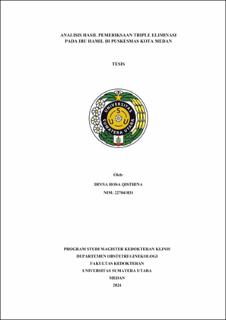| dc.description.abstract | Introduction: Triple elimination is a program that aims to achieve and sustain mother-to-infant elimination of HIV/AIDS, Hepatitis B, and Syphilis in order to achieve better health for women, children, and their families through a coordinated approach. In Indonesia, the prevalence rate of the three diseases is 0.39% for HIV, 1.7% for Syphilis and 2.5% for Hepatitis B. All three of these cause morbidity, disability, and death. Therefore, there should be an analysis of the results of the triple elimination examination and the incidence of sexually transmitted infections in pregnant women at primary health centers in Medan.
Methods: This is an observational analytic and cross-sectional. Sample collection was conducted using total sampling technique. The inclusion criteria in this study were all pregnant women who performed ANC and triple elimination examinations at the primary health centers of Medan and had complete data according to the characteristics of the study. The data obtained will be analyzed using SPSS.
Results: The majority demographic characteristics of the research subjects were 25-30 years old, with an education level of high school, housewife occupation, primary gestation, gestational age of 24.81 ± 6.31 weeks, average age of marriage of 24.5 ± 4.11 years, a history of marriage once and the most common husband's job is self-employed. There were 1.8% HIV positive cases, 3.8% hepatitis B positive cases and 1.5% syphilis positive cases. Parity status, husband's occupation, and marriage history had a significant relationship with triple examination result.
Conclusion: Data on screening results and demographic characteristics can be used as a reference for improvement and adjustment of existing programs | en_US |


